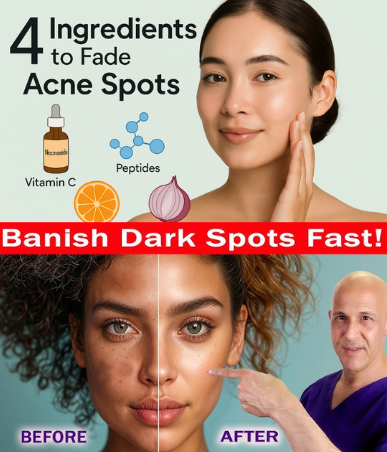
Dark spots left behind after acne can feel more frustrating than the pimples themselves. You try scrubs, facials, and home remedies, but nothing seems to work. These marks, known as Post-Inflammatory Hyperpigmentation (PIH), occur when acne damages the deeper layers of skin, leaving behind stubborn pigmentation.
Here’s the good news: they’re not permanent. With the right topical ingredients, you can fade these marks, restore your skin’s natural glow, and finally feel confident without layers of makeup. Let’s explore the 4 powerful ingredients that dermatologists and skin experts recommend to clear dark spots caused by acne.
Why Do Acne Marks Appear?
Before jumping to solutions, let’s understand the root cause. When acne heals, it often leaves behind inflammation that triggers extra melanin production. Melanin is the pigment responsible for skin color, and when it clumps in one spot, it creates dark marks. Depending on your skin type and the depth of damage, these spots may take months—or even longer—to fade naturally.
The right ingredients, however, can speed up the process by balancing melanin production, boosting cell renewal, and soothing inflammation.
Niacinamide – The Multitasker
Niacinamide is like the overachiever in skincare. It not only fades dark spots but also calms inflammation and strengthens your skin barrier. By preventing melanin-producing cells from reaching the surface, it helps reduce the visibility of acne marks over time.
- How to use: Opt for a concentrated niacinamide serum. Apply a few drops after cleansing and before moisturizing, ideally twice daily.
- Best for: All skin types—from dry to oily—since it hydrates while brightening.
Think of niacinamide as your skin’s bodyguard, shielding it from further irritation while fading the unwanted spots.
Peptides – The Skin Builders
Imagine peptides as tiny construction workers building stronger, healthier skin. These short chains of amino acids stimulate collagen production, which not only helps scars heal faster but also smooths out uneven texture.
Their moisture-retaining properties strengthen the skin barrier, while their antimicrobial action prevents new breakouts from causing additional damage.
- How to use: Start with peptide serums and slowly incorporate them into your daily routine to allow your skin to adapt.
- Best for: All skin types, especially those dealing with scarring and loss of firmness.
With peptides, your skin gets both repair and protection—two essentials for overcoming acne scars.
Video : The ULTIMATE Routine for Dark Spots | Doctorly Hyperpigmentation and Melasma Guide
Sodium Ascorbyl Phosphate (SAP) – The Gentle Vitamin C
If regular Vitamin C feels too harsh or irritating, Sodium Ascorbyl Phosphate (SAP) is the answer. This stable form of Vitamin C works wonders on acne-prone skin by fighting free radicals, reducing fine lines, and brightening overall complexion.
SAP not only fades dark spots but also prevents new ones by neutralizing oxidative stress. Think of it as your skin’s personal sunshine, but without the harmful UV rays.
- How to use: Apply a SAP serum in the morning for antioxidant protection throughout the day.
- Best for: Oily and acne-prone skin, thanks to its oil-soluble nature.
This ingredient delivers that radiant, even-toned glow while keeping breakouts at bay.
Allium Cepa Bulb Extract – The Scar Healer
Onion extract might sound unusual, but it’s a game-changer for acne marks. Rich in bioactive compounds, Allium Cepa Bulb Extract helps regulate collagen production, reducing scar size and fading hyperpigmentation.
When paired with other natural extracts, its power multiplies:
- Olive Leaf Extract – Boosts radiance and speeds up wound healing.
- Daisy Flower Extract – Naturally brightens skin by minimizing melanin production.
- Bulbine Frutescens Leaf Juice – Stimulates regeneration while fighting free radicals.
- How to use: Look for spot treatment gels combining onion extract with these plant-based ingredients for targeted results.
- Best for: All skin types, particularly stubborn post-acne scars.
This blend works like a natural skin-repair kit, tackling pigmentation from multiple angles.
How Long Until Acne Marks Fade?
Patience is key. Surface-level pigmentation (epidermis) can fade in 6–12 months with proper care. However, if marks extend into deeper skin layers (dermis), results may take longer. Consistency with the right products and sun protection will speed things up dramatically.
And here’s the golden rule: never skip sunscreen. UV rays worsen pigmentation by stimulating melanin production. Choose a broad-spectrum sunscreen with SPF 50+ and physical blockers like zinc oxide or titanium dioxide for maximum protection.
Video : See a Change in 2-4 Days: Banish Dark Spots, Hyperpigmentation, Melasma, & Acne Scars! Dr. Mandell
Final Thoughts
Acne marks may feel permanent, but with the right ingredients, you can absolutely win the battle against them. Niacinamide calms and brightens, Peptides rebuild, Sodium Ascorbyl Phosphate defends and clears, and Allium Cepa Extract heals and restores. Together, these four ingredients form a powerhouse routine that tackles dark spots at their root.
Stay consistent, stay protected from the sun, and trust the process. Clear, radiant skin is not just a dream—it’s achievable.


